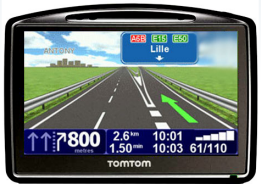Why my smartphone hasn't replaced my in-car GPS receiver ... yet!

Almost every smartphone comes with a built-in GPS receiver and mapping software (either pre-loaded or available as an optional purchase). Does this mean that the days of the in-car GPS receiver are numbered?

I own a smartphone (an iPhone 4) and I have numerous mapping apps installed on it. And I regularly use these apps for navigating when on foot, but when I'm on the move in my car I turn to a dedicated in-car navigation tool. Why? I'm glad you asked! Allow me to explain ...
- Screen As big as the screen on smartphones such as the iPhone are, they're not s big as the screens you can get on a dedicated device. The 3.5-inch screen on my iPhone 4 is dwarfed by he 4.3-inch screen on my TomTom 940. Oh, and the glossy screen on a smartphone is a pain too use outdoors compared to the matte screen on most in-car GPS receivers.
- User Interface (UI) The UI of a smartphone is designed to be read and used when the device is being held in the other hand. Compare this to an in-car GPS receiver has to work at arm's length while speeding along at 70 MPH.
- Integration Most in-car GPS receivers connect to other devices, bringing together a multitude of useful features from other devices - most can easily integrate with your cellphone, car stereo, media player and so on.
- Power I don't think I've come across an in-car GPS receiver that I'd describe as 'speedy' or 'highly responsive' in terms of the UI, but when I compare even my aging in-car devices with apps running on iOS I'm amazed by how clunky the apps are despite running on far superior hardware.
- Better battery life Running navigation software on any smartphone I've had really chews up the battery. It's no big deal when you have a car cord, but there are times (depending on the vehicle) where having a car cord trail across the windshield is a real headache.
Note: I'm pretty agnostic when it comes to in-car navigation - I have several devices from both TomTom and Garmin. Each have their strengths and weaknesses.
While I'm here it's only fair that I add a few downsides of in-car GPS receivers compared to smartphones:
- Awkward updating I've never owned a GPS receiver that's simple to update. The process seems to always be far more convoluted and involved that it should be. It's also hard to preserve settings on the device when updating the software, making the update process uncertain and painful.
- No over-the-air updates While many high-end in-car devices do offer a data connection to allow you to do local searches, there's none that I'm aware of that allows map corrections to be downloaded automatically.
- No apps I know, I know, we all lived happily for decades without apps until Apple came alone and changed things. I think it's time that companies like Garmin and TomTom kept up and offered a platform for developers to create apps for the devices.
- Cost GPS receivers aren't cheap, and it's cheaper to buy a new app for a smartphone than it is to buy a new device.
Now if I could find a suction mount that allowed me to fix my iPad to the windshield, that might make me leave behind my TomTom and Garmin. OK, I'm joking, but despite my love of a dedicated in-car GPS receiver, I do keep up with the navigation apps for the iOS platform (I have several such apps installed on my iPhone), and while they're lacking in some areas right now, I do think that over time the in-car GPS receiver will be replaced by the smartphone even by a stalwart like myself.
[poll id="644"]
What do you think? Let us know!